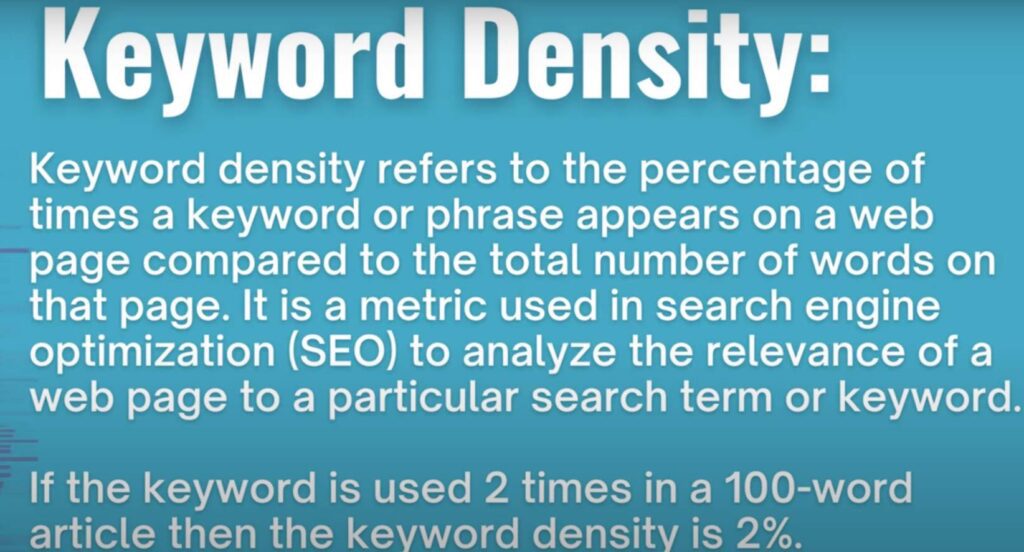Keyword density refers to the percentage of times a keyword appears on a webpage in relation to the total word count. A good keyword density typically falls between 1-3%, ensuring that the keyword is used enough to indicate relevance to search engines, without overstuffing the content.
Having a good keyword density is essential for SEO, as it helps search engines understand the focus and topic of the webpage. However, it is important to maintain a balance and avoid keyword stuffing, which can lead to penalties from search engines.
The key is to create high-quality, engaging content that incorporates keywords naturally and provides value to readers. Remember, the goal of keyword optimization is to improve visibility and attract organic traffic, not to prioritize search engines over the user experience.

Table of Contents
What Is Keyword Density And Why Is It Important?
Keyword density refers to the percentage of times a keyword is mentioned on a web page. It is a crucial factor in SEO as it helps search engines understand the relevance of a page to a specific keyword. The ideal keyword density is usually between 1-3%, although it may vary depending on the competition and niche.
Keeping the keyword density balanced is important to avoid over-optimization, which can lead to penalties from search engines. Keyword density can be calculated by dividing the number of times a keyword appears by the total number of words on the page.
By maintaining an optimal keyword density, websites can improve their visibility in search engine rankings and attract targeted organic traffic.
Factors To Consider For Keyword Density
Keyword density refers to the percentage of times a keyword appears on a webpage compared to the total word count. It is an essential factor in on-page SEO to optimize content for search engines. When determining the ideal keyword density range, several factors need to be considered.
Firstly, the specific keyword should be relevant to the content and strategically placed throughout the article. However, it is crucial to avoid overstuffing the content with keywords as it can negatively impact the user experience and search rankings. Finding the right balance is key.
Additionally, the prominence of keywords, including their placement in headings, subheadings, and the first paragraph, plays a significant role. Frequency is another aspect to consider, ensuring that the keyword appears frequently enough to signal relevance but not excessively. Keeping these factors in mind will help achieve an optimal keyword density for better visibility in search engine results pages.
Strategies For Optimizing Keyword Density
What is a good keyword density? When it comes to optimizing keyword density, there are strategies you can employ. Incorporating keywords naturally in your content is essential for SEO. One way to achieve this is by using variations and synonyms of your target keywords.
By doing so, your content remains relevant while avoiding keyword stuffing. When writing, keep your sentences brief and concise, with a maximum of 20 words each. Vary your sentence structures to maintain reader interest. Remember, readability is key, so ensure your content flows smoothly and is easy to understand.
By following these guidelines, you can improve your website’s SEO and attract more organic traffic.
Tools To Measure Keyword Density
Keyword density is an essential factor in optimizing website content for search engines. There are various tools available to measure keyword density accurately. Some of the popular keyword Researcher checker tools include SEMrush, Yoast SEO, Moz, and Google Analytics. These tools provide detailed reports on the frequency of keywords in a given piece of content.
Interpreting keyword density reports requires a deep understanding of SEO principles. By analyzing these reports, you can determine if your content is well-optimized or needs further optimization. It is important to strike a balance between using keywords strategically and maintaining a natural flow in your content.
Remember that keyword density is just one aspect of SEO, and it should be complemented with other optimization techniques to achieve the best results in search engine rankings.
Conclusion
Determining the ideal keyword density for your content is essential for optimizing your website’s search engine rankings. While there is no one-size-fits-all answer, maintaining a natural and organic use of keywords throughout your content is key. Keyword stuffing can lead to penalties from search engines, negatively impacting your site’s visibility.
честные казино с быстрыми выплатами
бездепозитные бонусы казино
играть в лучшем казино на деньги
база казино с бездепозитным бонусом
онлайн казино России
casino oyunu
Instead, focus on providing high-quality, informative content that satisfies the intent of your audience and incorporates relevant keywords naturally. Remember to prioritize readability and user experience, as search engines are increasingly focused on delivering valuable content to users. Regularly monitoring and adjusting your keyword density, based on performance analytics, can help you stay ahead of the competition.
By balancing keyword usage with compelling and engaging content, you can improve your chances of ranking well and attracting targeted organic traffic.



